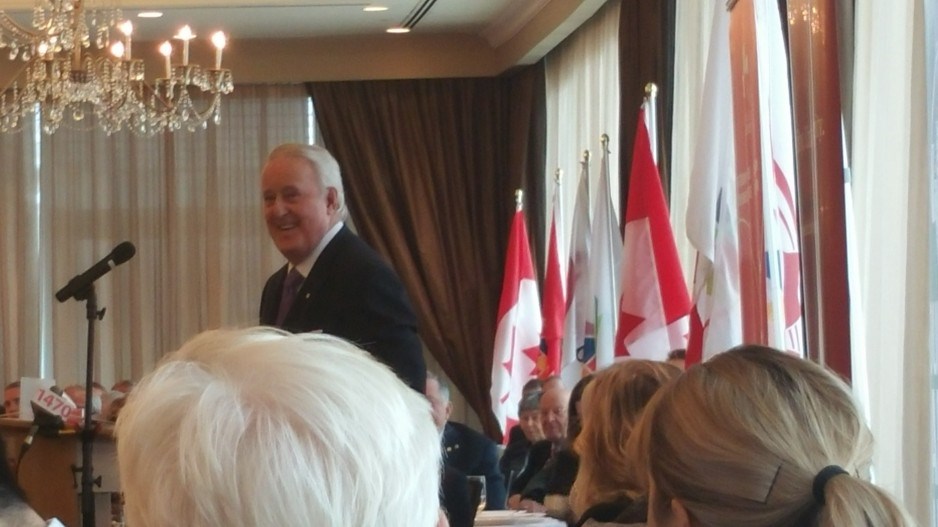If the North American Free Trade Agreement (NAFTA) has been as disastrous for the American economy as U.S. President Donald Trump says it was, it should be cancelled, former prime minister Brian Mulroney said Tuesday at a speech at the Canadian Club of Vancouver.
But the trade and employment figures over the last 30 years show it hasn’t been, said Mulroney, who negotiated both the initial Free Trade Agreement with the U.S. and NAFTA with the U.S. and Mexico.
“NAFTA was good for us, it was good for Mexico and it was good for the United States,” he said April 25 in a speech on free trade, softwood lumber and Canada-U.S. relations.
“And if that were not the case, I would recommend (to) the United States or Mexico that they cancel it. Because unless a trilateral treaty is good for everybody, and they all feel it’s a value to them…then we shouldn’t force this on anybody.”
Mulroney’s speech came the day after the U.S. Department of Commerce levied countervailing duties on Canadian lumber products. Those duties, which range as high as 24%, will increase the price Americans pay for Canadian lumber. The U.S. Commerce Department is also considering levying anti-dumping duties on Canadian lumber producers.
Quoting Bank of Canada Governor Stephen Poloz, Mulroney said, “Canada’s future prosperity faces no greater challenge than the winds of protectionism now swirling around the new U.S. administration,” and later said that “there are days when the Americans make it difficult to have good relations with them."
But the most immediate threat to the Canadian economy is not NAFTA, but softwood lumber duties, he said.
B.C. is most vulnerable to the duties, since B.C. accounts for more than half of all lumber exports from Canada to the U.S.
The U.S. Lumber Coalition argues – as it has in four prior softwood lumber disputes – that Canada subsidizes its softwood lumber industry through its Crown tenure system– a charge Mulroney pointed out has failed every time the dispute has been heard by international tribunals.
“It is not, as alleged, about subsidies in Canada,” he said. “It is really about restricting supply and increasing prices and profits for a few in the United States at the expense of home builders and potential homeowners.”
Unlike past disputes, negotiations around softwood lumber could get caught up in wider trade disputes, when Canadian and American negotiators sit down to renegotiate NAFTA this fall.
Trump has specifically targeted Canada’s lumber, dairy and, more recently, energy sectors as being unfairly subsidized.
Getting free trade deals with the U.S. is arguably Mulroney’s greatest legacy. NAFTA created a massive free trade region that includes 500 million people and a combined GDP of $20.7 trillion in 2015, he said.
“With less than 7% of the world’s population, NAFTA partners in 2015 represented 28% of the entire economic output of the world."
The benefits to Canada from free trade have been so obvious that successive governments have pursued other free trade agreements, the most notable one being the recently ratified Canada-European Union Comprehensive Economic and Trade Agreement (CETA).
“That European deal is going to bring untold billions to Canada and create…tens of thousands of new jobs,” Mulroney said.
In Canada, free trade created 5.2 million net new jobs over the last three decades, Mulroney said, pushing national unemployment rates down from 11.4% in 1993 to 6.9% today.
The U.S. has likewise benefited from job growth, Mulroney insisted, contrary to Trump’s assertion it has cost American jobs.
“NAFTA is the best thing that ever happened to the United States of America,” he said. “There’s no doubt about that. There’s a guy there who disagrees with me.
“You can ask Mr. Trump sometime, when he’s talking about NAFTA: How in the name of the Lord did America’s unemployment rate go from 9% to 4% if NAFTA was crippling the economy?”
Mulroney said he expects negotiations with the U.S. when NAFTA is reopened to be tough.
“We're getting ready for the mother of all negotiations,” he said.
“They will have their list of demands and will not be shy about fighting for them. Canada will have its own list of demands. And with preparation, patience and traditional Canadian competence, I am persuaded that the team put together by Prime Minister Trudeau will do a top flight job for our country.”




